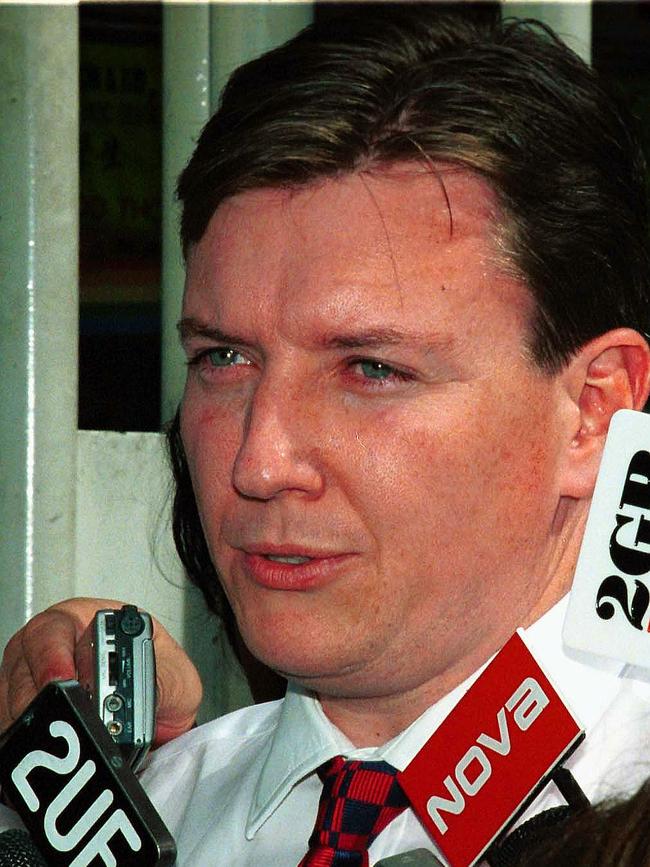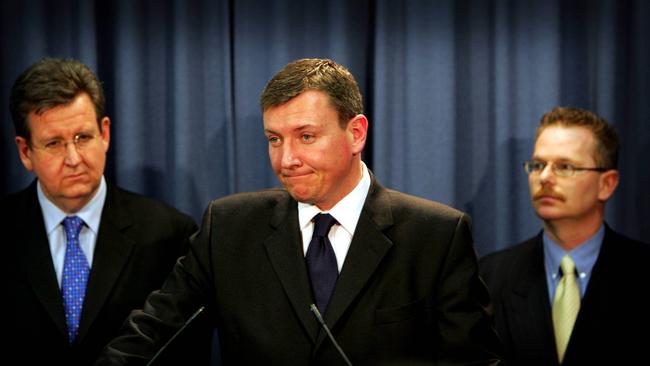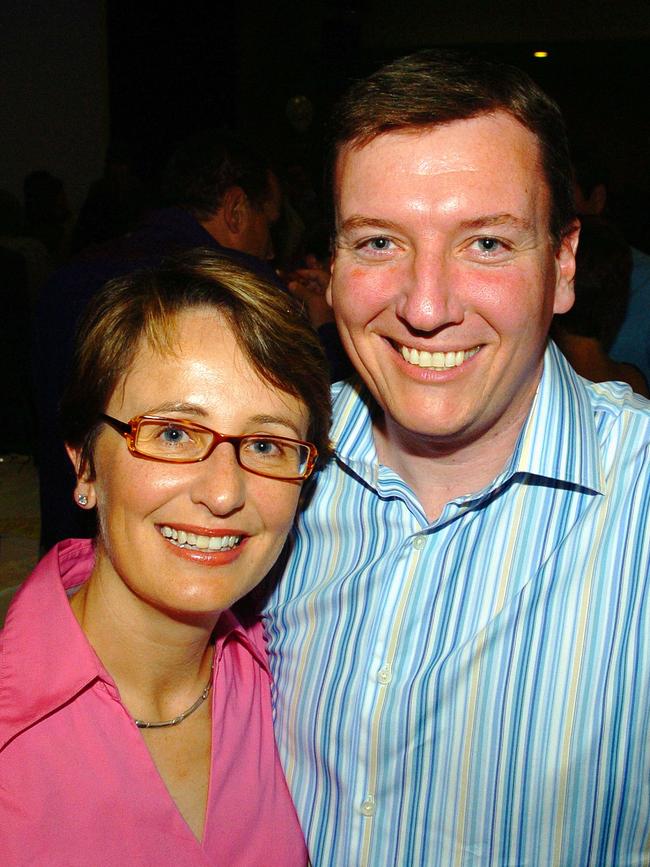John Brogden: ‘There is always something to live for. I’ve been there’
A mental health lifeline helped former NSW Liberal leader John Brogden turn his life around after a suicide attempt.

When John Brogden was elected leader of the NSW Liberal Party 20 years ago this week, he was one step closer to fulfilling his dream: becoming premier. He was just 33, whip-smart, hardworking, photogenic and restlessly ambitious.
Brogden was a new breed of Liberal for a new era. A self-described progressive on economic and social policy, driven to make a difference, he set about refreshing the party’s policies, sharpening its strategy, overhauling campaigning and making it competitive in the polls.
But three years later his political career was over. Brogden made unwanted advances towards female journalists and uttered a racial slur about Bob Carr’s wife, Helena, at a function. He resigned as leader and then, thinking all was lost, tried to take his own life. He quit parliament. He was just 36.
“I only ever wanted to be premier,” Brogden, 53, tells Inquirer. “I did not have a plan B. This is all I wanted in life. So, when that collapsed, everything collapsed for me. I catastrophised it and became suicidal very quickly. I felt ashamed about what I had done.”
He recalls sitting at Northside Clinic opposite Royal North Shore Hospital, medicated, with bandages on his wrists, and a psychiatrist telling him everything would get better. It was not a message he wanted to hear or could believe. It felt like torture.
“It is not possible that things can get better,” Brogden says he thought. “I hit the lowest point in my life. I thought the best solution was to take my own life because it would take away from everybody my shame, their shame associated with me. It was incredibly difficult.”
With the love of wife Lucy and their three children, Brogden has turned his life around. He has made lifestyle changes, sees a psychiatrist and is medicated. He has achieved success in the corporate sector. And he is a leading advocate for mental health services as chairman of Lifeline.

It takes courage for Brogden to talk about his mental health. It is, understandably, very difficult. He does so because it may help others grappling with depression. He also wants to change perceptions of mental health. It can be managed. There is help available. And a fulfilling and happy life can be lived.
“There is a way through even though you may think there is none, and society is more forgiving than you think,” Brogden says. “People are certainly more than willing to give you a second or even a third chance to come back.”
Scott Morrison, standing alongside Brogden last week, announced an additional $52.3m across four years for Lifeline in the budget to expand phone, text and online services for people in times of crisis and helplessness. It is in addition to an extension of annual funding of $15.5m for core services.
Brogden, who last year was elected president of Lifeline International and now is patron of Lifeline Australia, says calls reached their highest during the pandemic and remain high. While more people need help, it also means more people are seeking and getting the support they need.
It is a message Brogden needed to hear two decades ago. He had a stellar rise in politics. He was elected as the member for Pittwater, on Sydney’s northern beaches, in 1996 at age 27. Three years later he was a shadow minister and three years after that became leader when he challenged Kerry Chikarovski and won by 15 votes to 14.
Labor was in power, led by the popular and seemingly impregnable Carr. In 2003, Labor was re-elected in an essentially status quo result. Brogden thought he now could focus on regaining seats. Law and order, transport and planning were issues on which Brogden gained traction. He also made addressing social and economic disadvantage a priority.

When Carr retired in 2005, succeeded by Morris Iemma, Brogden thought the next election in 2007 would be competitive. “The longer I was in the job, the better I got,” Brogden recalls. “We could feel we were going to win seats and were in with a shot to win the election.”
He thought he deserved more recognition from the media for keeping the opposition united, retooling policies and strategy, and making inroads against the government. He worked long hours and pushed himself hard. He felt under pressure.
“I was deeply depressed and I hid it perfectly,” he says. “I would shower and shave, and put the suit and tie on, and turn up in front of the cameras, but I was miserable. I didn’t feel myself running down physically but I was running down mentally.”
Brogden’s parents divorced when he was young. His mother’s subsequent partner and husband physically abused her. “I really hadn’t dealt with all of the trauma and mental health issues of my teenage years,” he says. “I just pushed it very deep down and it drove me to get into politics. I was a very angry young man.”
His election to parliament, elevation to the shadow ministry and leadership did not bring fulfilment. “I got exactly what I wanted, probably younger than I thought I would, but I wasn’t happy,” Brogden says.

Looking back on that night at the Sydney hotel, where his world collapsed, Brogden accepts full responsibility for his actions. He was not drunk but became “too uninhibited” when he felt, now facing Iemma, that he was half a step closer to becoming premier. “What I said was inappropriate and I paid the price,” he says.
With attitudes to mental health changing and more support available, Brogden says he thinks he probably should have stayed in politics. He could have returned to the frontbench or leadership, or served as a minister.
“I had excellent doctors, nurses, care and love from Lucy and friends and family, but I needed to take a break,” he says. “I couldn’t pull it together back then but maybe I could today.”
He has probably saved more lives with Lifeline than he would have in politics. His corporate career is equally impressive. He leaves Landcom next month after a decade as chairman or chief executive. He has been chief executive of the Australian Institute of Company Directors, the Financial Services Council and Manchester Unity. He recently joined the board of Colonial First State and was appointed chairman of AusPayNet.
Having long idolised Robert Kennedy – his campaign posters still adorn the walls of his office – Brogden takes much from what Richard Nixon said at his resignation press conference in 1974: “Only if you’ve been in the deepest valley can you ever know how magnificent it is to be on the highest mountain.”
Brogden has made an extraordinary contribution to public life. While it may not be the plan A of an ambitious young man, it is nevertheless a purposeful life lived in service of others. “I want people to choose life over death,” Brogden says. “There is always something to live for. I’ve been there, so I know that is incredibly hard to hear and to believe. But I want people to know that there is a way back.”
If this story has raised issues for you, contact Lifeline on 131 114.




To join the conversation, please log in. Don't have an account? Register
Join the conversation, you are commenting as Logout